Preparation - Badilika Project
UNDERLYING PRINCIPLE OF CHALLENGING MEN WHO BEHAVE
ABUSIVELY / VIOLENTLY TO WOMEN AND CHILDREN -Pwani GBV Network
By Betty Sharon
And May Odhiambo
Table of contents.
Abbreviation
Executive summery
Introduction
Dialogue DPPC
Plenary Discussion Shimo La Tewa Main Prison
Plenary Discussion Shimo La Tewa Borstal
Dialogue Meeting With the Pwani GBV network
Briefing Reference Group
Way forward Reference Group
Appreciation.
Participants list
Pictorial
1.0
Abbreviations
CWID Coast Women in Development
DPPC Deputy Provincial Prisons Commissioner
GBV Gender Based Violence
GBV-RC Gender Based Violence Recovery Center
ICRHK International Centre for Reproductive Health Kenya
IP Inspector
KICODI Kisauni Community Development Initiative
MUHURI Muslims for Human Rights
SAVEDA Saveda Charity Savings
SUPT Superintendent.
WOFAK Women Fighting AIDS In Kenya
2.0
Executive Summary.
Badilika (Change) is the name of the project that was decided by the male sexual offenders at Shimo La Tewa Prison, now re-named the Rehabilitation Centre, the group of 19 male sexual offenders who concurred with us on 20th June at Shimo La Tawe Rehabilitation Centre feels there is a need to involve the sexual offenders in the fight against gender based violence. Perpetrators’ behavioral change, participatory learning approaches and involving perpetrators in outreach programs where they can open up and speak openly about their behavior change can create more gender-equitable relationships, thereby decreasing gender based violence.
In Kenya, sexual offenders after being charged in the court of law and sent to prison, are forgotten and people don’t have their tracks once they finish their terms, this makes it easy for them to follow their targets for revenge and go back to their old ways or even worse ways of offending. It is also not easy to get and approach these sexual offenders for behavioral change out of prison.
The project aims to work hand in hand with the Shimo La Tewa Rehabilitation Authority and sexual offenders in prison who have accepted their mistakes and ready to participate in the program Badilika to be ambassadors , challenging males young and old to be 'MEN NOT VIOLENT NOT SILENT'!
The project aims to
-Provide an opportunity for men, to be both challenged about their abusive behavior and supported to change.
-Make abusive men accept their offenses and take up the challenge with renewed hope that they can change and hence prevent further damage to their partners or children and the society.
-follow the underlying principles of challenging men who behave abusively or violently to women and children, as stated below
3.0
Introduction.
The Pwani GBV Network under the secretariat of Coast Women in Development is a network that deals with the prevention and awareness of gender based violence in the Coast Province. The network organizations give various individual supports to the survivors of Gender Based Violence like legal support and counseling.
The Pwani GBV network was started after the realization that there were many victims of post election violence who suffered both physically and psychologically due to the abuse inflicted on them. There was need for a body to come up and take responsibility over the prevention and awareness of gender based violence. This is how the GBV prevention network was formed and to date the flag for fighting gender based violence is forever raised high.
The Badilika Project is a follow-up from the Engendering Violence Conference in Uppsala University where Betty Sharon represented CWID in 2009 and learnt about working with abusive men to challenge violence against women and children, in a presentation by Dr Chris Laming. At the same conference there was also a presentation ., on The Community Walk Against Family Violence by Dr Karen Crinall, Ms Daphne Yarram, Ms Kerry Hamer and Dr Chris Laming, that presented a model of collaborative research and evaluation of a community awareness project. The report of this project is now freely available at www.coastwomen.org
The Badilika Project is now a joint initiative of Dr Chris Laming and Pwani Gender Based Violence network. The project will mainly focus on the male perpetrators of GBV who have accepted their offenses and are ready to change at Shimo La Tewa Rehabilitation Centre and at the Borstal. This is in order
to observe their behavioral change while undergoing correction by law and
to find ways of integrating them back to the society in a manner that they will be accepted back as family.
to try to ensure they do not indulge in vice again and that vulnerable victims are safe
to mentor them be ambassadors of GBV change in their communities.
4.0
Day 1
Meeting With DPPC
The meeting with DPPC James Sawe was an opening of the dialogue with the prisoners, he depicted how offenders come back to the prison afterwards. We talked much on prison reforms , denial, revenge acceptance from the community and family as well as repentance. .
5.0
Plenary Discussion Shimo La Tewa.
The meeting commenced with an intro from the IP Abbas and was followed by one from Sharon about the Pwani GBV Network.
A number of issues were raised over the next -3 hours.
In some ways the meeting was quite extra ordinary: ..eg the fact that.
That the prisoners who were present were all sex offenders
That they introduced themselves by name, followed by the offence that they had been convicted of
Those who described their offence as ‘defilement’ made the distinction of whether it was with a boy or a girl.
The IP Abbas and IP Wamboi who sat with us were obviously treated with a level of regard by a number of the prisoners.
That the men disclosed very much about their cases
That the men, at least 12/19 identified that they would like to form a club that was about men taking responsibility for their offence and changing.
That the name suggested and taken up, was ‘Badilika’ (change)
That the men were keen to begin the group as soon as possible
That the prison officers (inspectors) were very supportive of the possibility of Pwani GBV beginning a group with the men
That the inspectors expressed clearly that they wanted to work with whoever Pwani GBV sent to facilitate the group/club
That they also very strongly supported the need expressed by some of the men that Pwani GBV start a post release group that the men would be able to go to on release, getting support that they needed to successfully re-integrated into society
What was not so extraordinary was:
That a number of the men were in denial
That 30% of the total number of offenders in Shimo La Tewa Main are there because of their SGBV
That those offenders we talked to were mainly ‘defilement’, cases,
That a number of the men said they had been falsely accused
That those same men (about 3-4 out of 19, took up about 50% of the speaking time)
That they were challenged about the above,…and were asked “why is it that a group of men talking about what helps them be less violent, spend more time on the reasons why it is unfair that they are being punished?”
That a small number of prisoners dominated the group
The articulate ones seemed to speak for the less articulate
6.0
Plenary Discussion Shimo La Tewa Bostal
At Borstal Superintendent Aggrey Akoyo who is in charge of Borstal is a counselor and a teacher by profession. He understands the youths at the institution and their cases and feels more like a father to them He works familiarly with IP Roda a social worker by profession, who he describes as a mother to the boys . 21 boys were gathered to talk to us by Mr Manene , a welfare officer at the institution. In the Borstal it was different, listening to the stories by the boys and most of it was about them trying to discover themselves .
Summary of offences of the Borstal group (total 21)
Defilement - 16
Unnatural Act -2
Sexual exploitation -1
Attempted to rape /defilement -2
Chris Laming gave a short talk to the boys in which he expressed the following:
You are like the beautiful small trees that l have seen you are growing in the nursery here
With care, nurturing and watering, they will grow and become as this big tree that is now giving us shade
Some will give fruits and some beautiful flowers, but only if you accept change
It is difficult to change, but possible with help and support from one another
You are not your offences and your offences are not you
You should be identified by your self or the training that you are undertaking in this institution but not by your offenses.
If you accept do disassociate yourself from your offences you will be able to become yourself and come off stigmatization, gain respect from the community, and from your family and your peers.
But you have to choose to do that, for yourself and for others, as well as challenge and support each other to do the same and be ambassadors of human rights
Concerns from the boys.
I got charged in court of law for defilement yet we are both underage
Ours was an affair , the girl has my child and living in our home till now yet am here serving my term and we are both underage
How will I convince her family to accept me since she has refused to back to them and is living with us?
Will there be a forum to introduce our change behavior to the community?.
They were so eager to be assisted with the change process that they offer to perform a poem and a song about their life story to the participants at the network dialogue meet. This went well with Supt Akoyo who did not only allow them permission to come but also Dr Laming to plant a Badilika Tree to commemorate the occasion.
7.0
Dialogue Meeting With the Pwani GBV network
The attendance of the members was exceptional , with representatives from MUHURI and FIDA as observers , Introduction of participants by May Odhiambo from the Secretariat of the network ( CWID) released the Network`s introduction by Sharon of which then Liz Aroka from ICRHK/ GBVCR gave a description of how cases are handled at the GBVCR at Coast General Provincial Hospital.
Trauma that the survivors go through.
How cases are followed in court
How some of the survivors are stigmatized
How ICRHK have introduce new facilities at the laboratory
Researchers at the laboratory
The challenges at the GBVRC.
Dr Chris Laming, could sense the angst of the participants about his work with the sexual offenders , he requested for the questions before he could give his talk and below were the concerns from participants.
What motivated you to begin working with abusive men?
How did the community view you when you started this kind of work?
How do you feel working with perpetrators?
What do you do about men who have disability and are being abused?
Response
No one is born abusive/violent , it is the way people are brought up. A boy whose parents are violent will often learn to solve his problems through violence, just as a girl might learn to see such GBV as ‘normal’. It is important to work with abusive men so that their children don’t take after them in using violence and abuse.
At first the community are hesitant but after sentizisation they see the reality in rehabilitating the abusive men and involving them in the prevention / awareness of gender based violence.
Working with the perpetrators is testing however to achieve your goal you must work with only those who have accepted their offences and ready to change, working with this kind of group can be fruitful and when abusive men talk of repercussions of violence to the community and their behavioral change people tend to be keen for the message.
Men with disabilities needs protection from violence as any other human being and women who violates them should face the law, Some women too, need behavioral change. The bottom line is that most GBV is done by men and that any work with them to challenge that behaviour must have as its ultimate aim the greater safety and well-being of women and children.
Those who work with men for behavior change must ensure that they do not give women and children a false sense of safety. Behavior change can take a long time and persistence. Three steps forward and one back.
Some men are highly resistant to changing to non-violence and learning respect. Most men can change and a few seemingly never will. Hence ongoing risk assessment is essential.
8.0
Way Forward.
A reference group to be formed of key players (eg the group that went to Shimo la Tewa and Dr Laming with Liz Aroka as ex official)
There will be three Badalika groups:
Group A: clients of the Rehabilitation Centre who (Shimo La Tewa Main)
Group B: juvenile clients ( Shimo La Tewa Borstal)
Group C: A post release group based at CWID where those from A and B can have a place and time to meet regularly, to encourage them to re-integrate into society (….there should be an alternative place if women feel not safe anymore to go to CWID if they realize know that these past offenders will be there….also there should plan against those men who may choose to use CWID to stalk women who have been victims)
Building trust’
Training of the network members and domestication of the tools that Dr Laming is to send.
need to cost the service provision:
evaluation: record twice a month feedback questions from the men in the group…what worked what did not, what was helpful…what was not.
debriefing
supervision
!
|
Participants List for Pwani GBV network |
||||
|
1 |
Beatrice A. Agola |
Dream Achievers |
072709620 |
|
|
2 |
Dorcas Wadzo |
Dream achievers |
0713 670 904 |
|
|
3 |
Munira C. Abubakar |
Ujamaa Center |
0722 780 692 |
|
|
4 |
Ken Odiwuor |
Ujamaa Center |
0721 785 893 |
|
|
5 |
Susan Lewa |
FIDA- Kenya |
0722 515 193 |
|
|
6 |
Lucas Kahindi |
Haki Yetu |
0719 734 999 |
|
|
7 |
Ezekiel Kodonde |
WOFAK |
0722 918 084 |
|
|
8 |
Elizabeth Aroka |
ICRHK |
0722 837 531 |
|
|
9 |
Lilian A Ponge |
Women Development Bamburi |
0721 217 966 |
|
|
10 |
Stephene Orangi |
SAVEDA |
0700 437 272 0722 886 898 |
|
|
11 |
Naisingoi M Matano |
Baraka FM |
0720 612 609 |
|
|
12 |
Simon Kioko |
Baraka FM |
0723 482 956 |
|
|
13 |
Bryan Kinale |
Baraka FM |
0724 603 306 |
|
|
14 |
Millicent Okello |
ICRHK |
0721 935 040 |
|
|
15 |
Jane Wangui Gaitho |
Dream Achievers |
0710 342 175 |
|
|
16 |
Miriam Karama |
Agenda Yetu Initiative |
0725 839 745 |
|
|
17 |
Asha Nyakundi |
KICODI |
0724 666 486 |
|
|
18 |
Flora Ali |
CWID |
0723 916 456 |
|
|
19 |
Tom Ngar |
CWID |
0724 528 142 |
|
|
20 |
Maryline Laini |
CWID |
0721 915 242 |
|
|
21 |
Betty Sharon |
CWID |
020 262 2268 |
|
|
22 |
Monica Charo |
MUHURI |
0704 620 922 |
|
|
23 |
Hassan Greeve |
Prepared Society |
0722 381 028 |
|
|
24 |
Chris Lamming |
Monash University |
(61)044900139 |
|
|
25 |
Charlse Manene |
Borstal Institution |
0725 482 527 |
|
|
26 |
Joseph Limo |
Borstal Institution |
0721 887 699 |
|
|
27 |
Daniel Mutuku |
Borstal Institutition |
0725 676 954 |
|
|
28 |
Sospeter M waura |
Borstal Student |
|
|
|
29 |
Daniel Kimani |
Borstal student |
|
|
|
30 |
Hassan Ali |
Borstal student |
|
|
|
31 |
Piara |
Baraka FM |
0726 317 872 |
|
|
32 |
May Odhiambo |
CWID |
0724654642 |
|
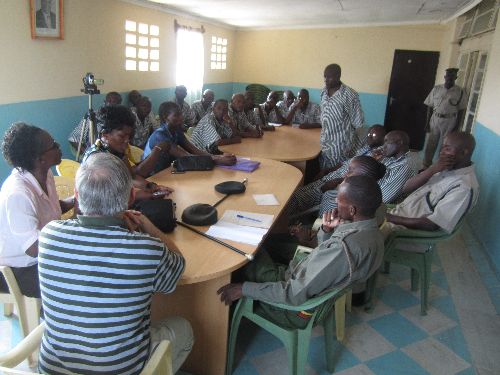
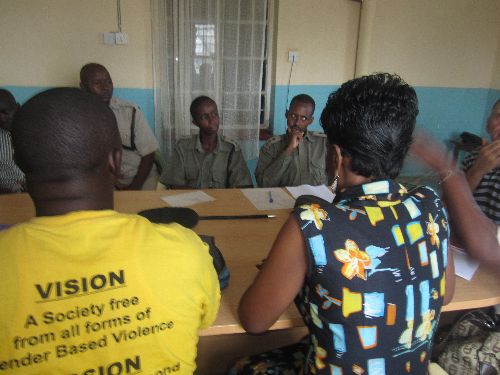
Above:
In the two pictues above: there are network members, prison officers , Badilika group and Dr Laming during the dialogue meeting at Shimo La Tewa Main.
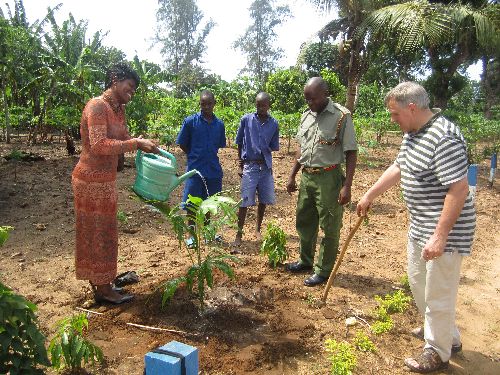
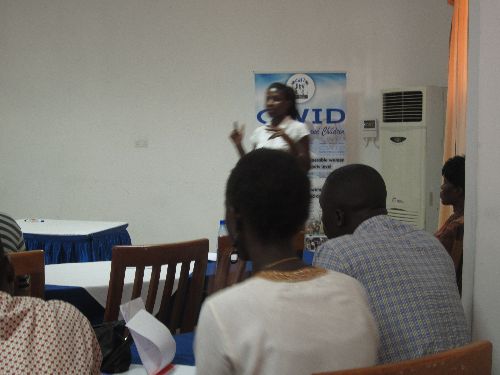
Above: Above:
Betty Sharon watering the Badilika tree after Liz Aroka ICRH givinga talk on GBVRC(Gender Based Violence rescue
It was planted by Dr Lamming at Shimo La Tewa Borstal. Centre)that is found at the Coast Provincial General Hospital
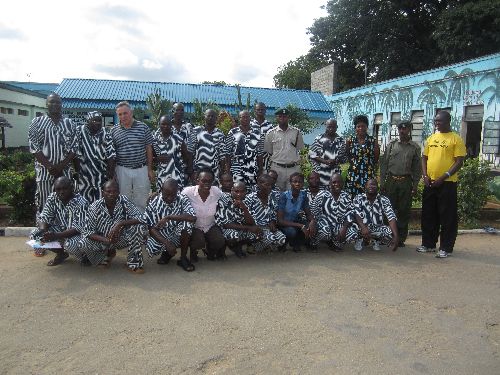
Above
‘Badilika Group’ photo